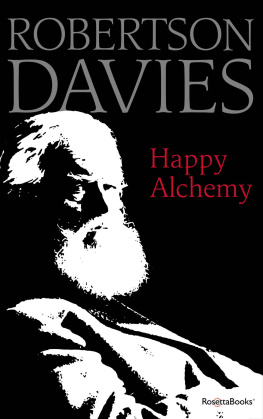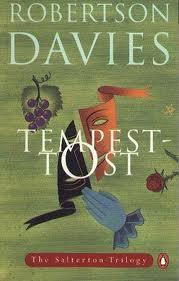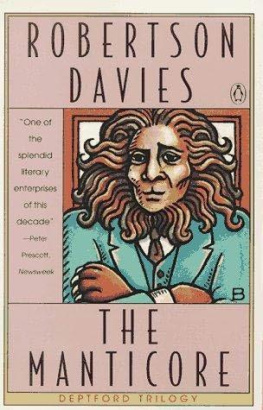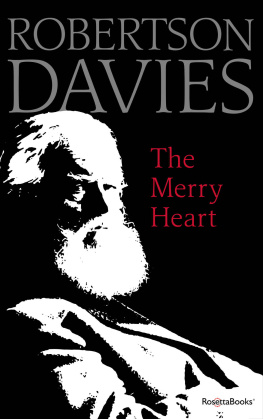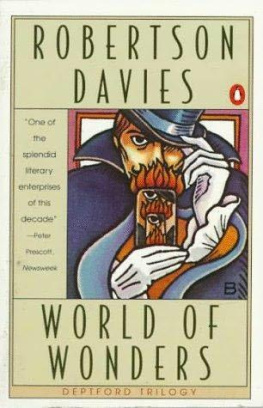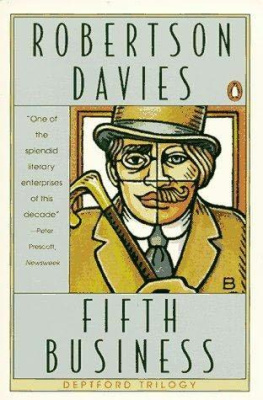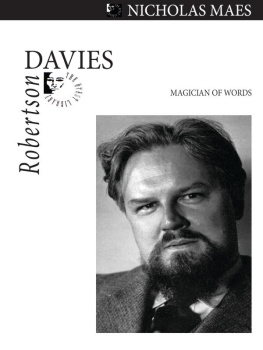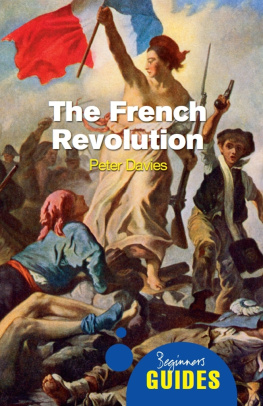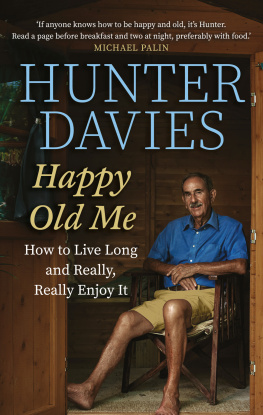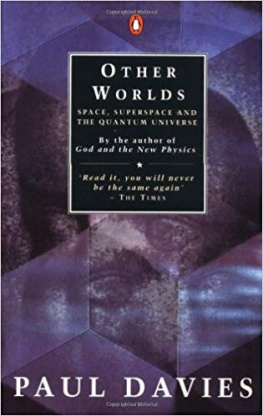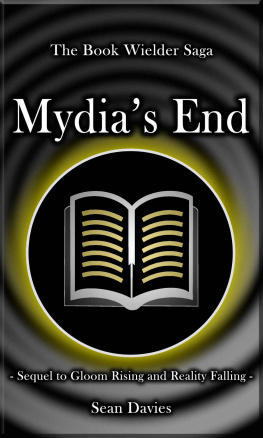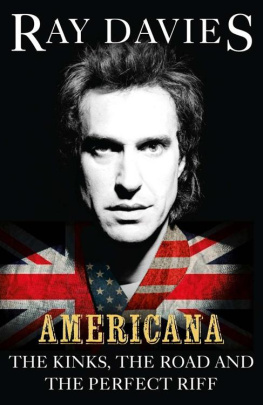H appy A lchemy
On the Pleasure of Music and the Theatre
R obertson D avies

Rosetta Books New York, 2019
Happy Alchemy
Copyright Pendragon Ink, 1998
Introductions Jennifer Surridge and Brenda Davies, 1998
Cover art and Electronic Edition 2019 by RosettaBooks LLC
All rights reserved. No part of this book may be used or reproduced in any form or by any electronic or mechanical means, including information storage and retrieval systems, without permission in writing from the publisher, except by a reviewer who may quote brief passages in a review.
Cover jacket design by Lon Kirschner
ISBN e-Pub edition: 978-0-7953-5233-1
ISBN POD edtion: 978-0-7953-5249-2
By happy alchemy of mind
They turn to pleasure all they find.
matthew green (16961737)
C ontents
I ntroduction
W hen douglas gibson wrote the Introduction to The Merry Heart, he mentioned the large number of unpublished speeches, commissioned book reviews, and other short pieces that Robertson Davies had accumulated in his files before his death in December of 1995. Given the impressive variety and scope of this material, it was decided to have two books: one about reading, writing, and books, which is The Merry Heart, published in 1996; and one mostly about theatre, opera, and music, which is Happy Alchemy, the book you hold in your hands.
The title, Happy Alchemy, comes directly from the English poet Matthew Green, still remembered by some for the couplet:
By happy alchemy of mind
They turn to pleasure all they find.
The metaphorical alchemy here is very distant from the primitive chemistry and mystification discussed in the first essay in the book. There Robertson Davies explains the magic that can attend a live performance. What alchemy really means is something which has attained to such excellence, such nearness to perfection, that it offers a glory, an expansion of life and understanding, to those who have been brought into contact with it. He continues, What the critics mean, then, when they talk of alchemy in the theatre, is something so good that it seems to have gone beyond what may be explained in terms of talent.
We have included in Happy Alchemy selections that show the diversity of Robertson Davies, whether writing for himself to read or for others to perform. There are speeches, prologues to plays, articles about the theatre and opera, a lengthy discussion of folk-song, a libretto for a childrens opera, a ghost story set to music, even a suggestion for a film scenario. There are also some thoughts about his own plays when they were published again in the early 1990s that shed light on his own play-writing ambitions and on the theatre in general. And towards the end of the book the focus widens as he discusses Jung or savages contemporary politicians. This is, in short, a lively book about more than the lively arts.
We have left the speeches in their full text including the introductory paragraphs: they cover thanks to the host, how the lecture came about, apologetics for the title, and how the topic was decided upon. As Robertson Davies explained in the introduction to One Half of Robertson Davies, this is where the speaker clears his throat and gets over his nerves. There is some repetition or overlapping between pieces in the course of the book; but we thought, for example, that his account of the differences between the novel The Bride of Lammermoor by Sir Walter Scott and the opera Lucia di Lammermoor by Donizetti was so interesting that it could be read in different contexts.
At the beginning of each of the thirty-three items in the book you will find a brief introduction that sets the scene, followed usually by a diary entry or two. Robertson Davies had a life-long fascination with the diary form, starting with diaries he kept as a schoolboy. He went on to make use of the form in his books The Diary of Samuel Marchbanks and The Table Talk of Samuel Marchbanks, which were published in the late 1940s, and again in 1985, this time in one volume as The Papers of Samuel Marchbanks.
He kept many diaries over the years but in 1957 he decided to start Theatre Notes which would include his opinions of all the theatrical productions he saw. At the beginning of 1962 he changed these notes into a Theatre Diary to resemble similar records that had become an important resource in the study of drama, his own specific academic field, which he taught at the University of Toronto for twenty years. As Canada had no such records, he decided to create some for use in his own teaching of the history of drama and as an aide memoire. He kept this diary for the rest of his life, with the final entry describing a production by the Canadian Opera Company on October 17, 1995.
On the opening page of these Theatre Notes he wrote:
In this book I want to make a record, as complete as memory will allow, of my experiences, chiefly as a playgoer, but with some references also to what I have done at one time and another, as an actor and playwright. For as long as I can remember, playgoing has stood first among all pleasures with me, and although to most people it is simply a pastime, I think that I have brought qualities to it which raised it above that. I have never really been a good actor (though I have had my moments), and it may prove that I was not a good playwright, but I sincerely believe that I have been a good playgoer, and that is something better, perhaps, than having been a well-known critic. Critics often do not like the theatre; I have never liked anything better.
To give Robertson Davies perspective on the events surrounding some of the plays and operas that are the topics of speeches, we have selected from these Theatre Diaries the entries that give his opinion of the actual performance, or of a related production. We know, of course, from the warm reception accorded to The Merry Heart that readers enjoyed the entries from Davies daily diaries or his travel diaries that described the circumstances in which he wrote or read these selections. We have followed the same practice here, in the belief that they (with the additional bonus of the Theatre Diary entries) take us behind the scenes with him in a revealing, interesting, and sometimes controversial way. It was Robertson Davies wish that his diaries be sealed for a period of time following his death, so that now we are able only to have small glimpses of his thoughts on plays he saw and on his eventful life, but can look forward to more of this fascinating material in the future. His publisher has even suggested that in time, to the list of Robertson Davies, teacher, critic, playwright, and novelist, the world may add the category Robertson Davies, diarist.
Happy Alchemy has been organized so that pieces flow from theatre to opera to music to wider topics that lead to the final selection on collecting, which sums up all the topics in the book. The reader should, of course, keep in mind that many of these pieces were written to be spoken. To get the full impact of them, try reading them aloud, and those who have heard Robertson Davies read may hear him again in the minds ear.
We would like to thank Douglas Gibson for all his help in making both The Merry Heart and Happy Alchemy a reality; Judith Grant for her biography, Robertson Davies, Man of Myth, on which we have drawn; Moira Whalon for her aid, suggestions, and incredible proofreaders eye; and Thomas Surridge for his encouragement, patience, and advice on computer matters.
Next page
